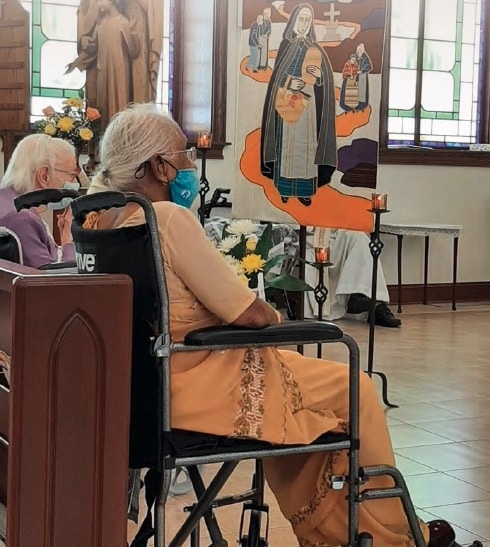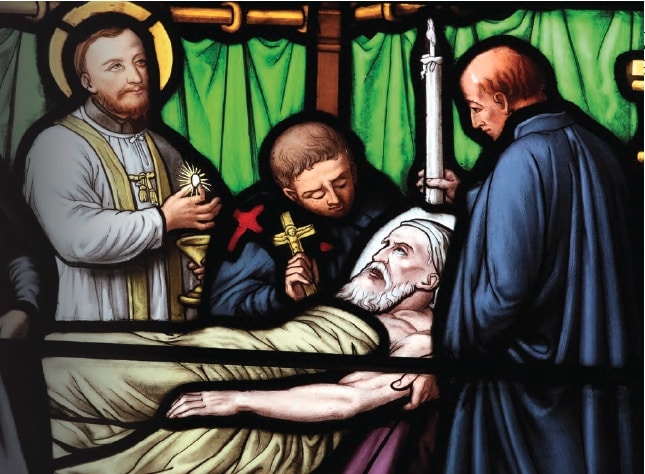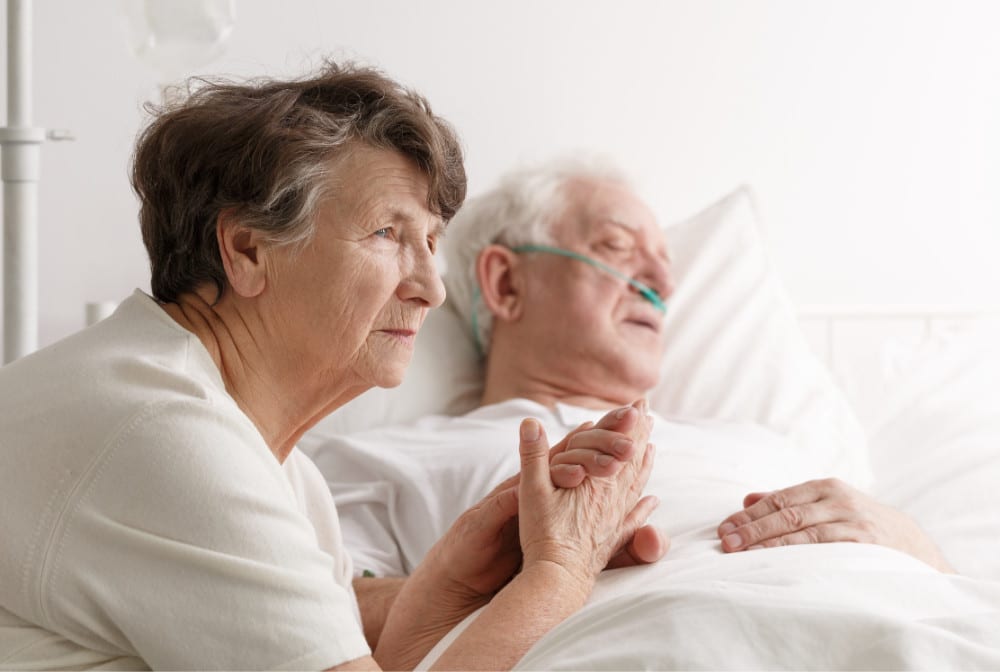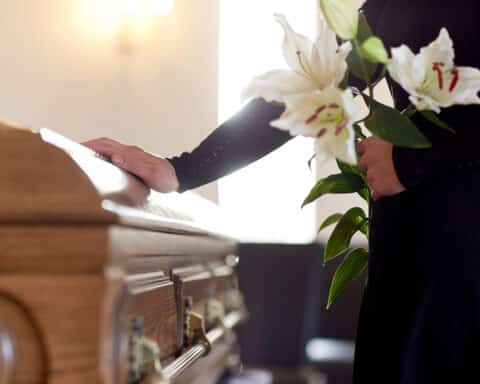My grandmother had been sick for some time. Alzheimer’s disease was taking its toll, leaving its dreadful mark on her and our family. In the last year of her life, she suffered two broken hips in as many months. One was operated on, the other wasn’t. I wasn’t sure how much more suffering she could take, and began praying more intently and regularly for her peaceful death. Specifically, I began praying the novena for St. Joseph’s feast day in March precisely for that intention. On the eighth day, our prayers were answered. It was on St. Patrick’s Day that my beloved grandma went to meet the Lord.

Her death came as suddenly as it was expected. While our hopes and prayers were that the Lord would take her in peace, death came for her with little fanfare. It was a slow fading away. Somewhat providentially and unrelated to any concern that she might soon be leaving us, three of her sisters came to visit her the day she died, not knowing it would be her last day. When nursing home aides made things clear to my mom as the sisters arrived that my grandma likely wouldn’t see tomorrow, I left at once for the two-hour drive. And I’ll forever be grateful that I could be with her for the last six hours of her life.
Our visits in the months before her death were always grounded in silence. Just being with her was itself a gift after Alzheimer’s took most of her from us. But this time it was different. Arriving at her bedside, I could tell by looking at my grandma that things had indeed taken a sudden and permanent turn. Sitting there, even in the familiar silence, knowing this moment would come, it was unsettling not knowing exactly what to do, what to say, how to think, how to pray. With some family present for a few of my grandma’s final hours, I could sense everyone was, in their own way, left wrestling with a final and unknown frontier. My grandma was always a constant in all of our lives, for over eight decades.
In those last hours, it was a gift to me, and I can only hope to my grandma, too, that the Church’s prayers and rituals were available to fill up the void, to center us, to guide us, to give us clarity, purpose, strength and hope.
As for me, I kept thinking about how my grandma’s beautiful life, which began in 1940, was to reach its conclusion in my presence in 2022. I found myself simply trying to proceed to an unknown future, amid a wave of emotions and thoughts, pushing aside competing concerns, while striving to accomplish and advocate for what matters most for her. And in those last hours, it was a gift to me, and I can only hope to my grandma, too, that the Church’s prayers and rituals were available to fill up the void, to center us, to guide us, to give us clarity, purpose, strength and hope.
None of us is immune to sickness and death. All of us will experience it ourselves, and we experience it in different ways with those around us. It would do all of us well to be more fully aware of what resources the Church gives us to pray with those who are sick, elderly and dying for the good of their souls as they face the difficulties, sufferings and fears that lay before them. In addition to making resources more widely available to people, we need better catechesis as well. In the end, a greater appreciation of and wider celebration of the rites and prayers for the sick and dying will be only a further extension of Christ’s love for all our brothers and sisters, a service of love for their good.
I. PASTORAL CARE OF THE SICK
Anointing of the sick
When someone is sick, elderly or dying, Catholics tend to automatically think of sacramental anointing. But we don’t tend to think about the sacrament consistently. Some only think it is for those who are actively dying while others think it ought to be received without serious reason. Sacramental anointing seems to be one of the more underappreciated, misunderstood, under-utilized and least talked about of our seven sacraments.
Some of it is a matter of poor catechesis, some of it is a growing shortage of priests and diminished availability, and some of it is a matter of the culture and our own self-reliance rather than our reliance on God, particularly in times of vulnerability. But whatever the reasons that anointing of the sick doesn’t seem to get its proper due, we can be sure it is an important opportunity to receive Christ’s grace and make his life our own.
The sacrament, in fact, conforms us more clearly to Christ, especially to his passion and death. Through his presence and grace in the sacrament, we are reminded we are not alone, that our struggles, pains and sufferings are not isolated; that we can lean on the crutch of the cross amid our illnesses, infirmities and approaching death to make sense of it all and find strength, purpose and hope.
Visits to the sick may use a ritual centered around Scripture and prayer. An important aspect of these visits is to help the sick person be able to pray, as prayer can at times be difficult when ill.

Anointing of the sick is explicitly mentioned in Scripture, in the New Testament’s Letter of St. James (5:14-15), which also identifies it as a ministry of the priest. Through him, Christ is able to encounter, accompany and strengthen those who receive the sacrament. Jesus can bring physical healing to the person, of course, as he brought the same to so many during his public ministry. But as those cures were meant to herald the coming of the Kingdom of God, our prayers for healing now originate mostly from a desire for spiritual healing in the face of illness and death. Christ conquered sin and death, and, through his grace, we share in the victory of his passion, death and resurrection. We experience in this sacrament Christ’s peace, assisting us to face the difficulties ahead, as well as his courage and determination to embrace the will of God for our sanctification and for that of the whole world.
We do not need to be at the point of death to receive the sacrament, a fact sometimes confused in the minds of many. The sacrament is for all those seriously ill, so some discernment is needed to determine applicability.
Special graces of the anointing of the sick
According to the Catechism of the Catholic Church (No. 1532), “The special grace of the sacrament of the Anointing of the Sick has as its effects:
-
- the uniting of the sick person to the passion of Christ, for his own good and that of the whole Church;
- the strengthening, peace, and courage to endure in a Christian manner the sufferings of illness or old age;
- the forgiveness of sins, if the sick person was not able to obtain it through the sacrament of penance;
- the restoration of health, if it is conducive to the salvation of his soul;
- the preparation for passing over to eternal life.”
Celebration of anointing of the sick

There are times during the year that parishes might offer communal celebrations of the sacrament, either within the context of the Mass or as a separate celebration. The sacrament is available for those whose health is seriously impaired, discerned without scrupulosity, and should not be administered indiscriminately and without prudential judgment. Those to be anointed include the elderly and those preparing for surgery. It can be repeated if the illness returns, if the same illness worsens or has become chronic, or when requested and determined by the minister’s pastoral judgment to be warranted.
Timing for anointing
The Sacrament of Anointing of the Sick does not consist exclusively of what is commonly referred to as the “last rites” of the Church. It is a sacrament to be celebrated early in illness and may be repeated as a condition worsens or death is thought to be approaching. What constitutes “last rites” would consist of viaticum and the Commendation of the Dying ritual prayers.
Part of overcoming this common misunderstanding of the sacrament’s timing is to encourage the celebration of the sacrament outside of preparation for death itself. Many priests say privately, but would do well to announce more regularly in the pulpit or elsewhere, that the faithful should not wait until death seems imminent to request sacramental anointing. With fewer priests, and more faithful under their charge in many places, it has become increasingly difficult for priests to be available at a moment’s notice. But waiting also keeps God’s grace from the person needing it. It is important to see to it that a person in need of the sacrament can receive it as soon as reasonably possible.
Visits to the sick
The Sacrament of Anointing of the sick itself is far from the only opportunity for spiritual care of souls, and the Church envisions that we are regularly to be offering those who are sick, elderly or dying. There are a variety of rites and prayers available from the Church’s liturgical treasury that help us to minister to the vulnerable among us. In addition to the rites for celebrating anointing, these are all contained in the rites of Pastoral Care of the Sick, and they should be made more widely known and available.
Visits to the sick may use a ritual centered around Scripture and prayer. An important aspect of these visits is to help the sick person be able to pray, as prayer can at times be difficult when ill. The visits are also meant to accompany, encourage and strengthen the sick. These visits should also be pointing toward and flowing from visits in which Communion is received by the sick person. There are also rituals for the administration of Communion to sick persons in ordinary circumstances or for those in institutional care facilities.
| Don’t neglect the sick and elderly |
|---|
 Sometimes we can think it’s easiest to tend to the spiritual care of our infirmed and elderly at their place of residence. And that can certainly be the case. But, as much as loneliness accompanies old age and illness, it is important to still invite and offer bringing them to Mass and other religious and social activities. It’s equally important to ensure that an adequate ministry of care is organized by and carried out in our parishes. In addition to sacramental and pastoral ministry from priests and deacons, which is vital, well-trained lay ministers and volunteers need to be active and involved. Leading the recitation of the Rosary, distributing holy Communion, offering a Bible study, and offering general companionship and accompaniment is crucial and invaluable. There are many opportunities that need volunteers and courageous, joyful disciples to make themselves available for the important ministries of caring for our sick brothers and sisters. |
II. PASTORAL CARE OF THE DYING
Viaticum
Each illness is different, just as is each death. In the case of the latter, with the help of medical professionals, we try to read the signs of approaching death so that we can be as present and attentive to the person’s needs.
Christ said “Whoever eats my flesh and drinks my blood has eternal life, and I will raise him on the last day” (Jn 6:54). It is, therefore, ideal for a sick, elderly or dying person to be regularly receiving Communion as far as he or she is able. To ensure this, care should be taken to contact the local parish, or the spiritual care staff if at a nursing or medical facility, early in the stages of incapacitating illness or infirmity. Often there are care facilities at which Mass is regularly celebrated or where Communion is distributed, but in some cases it must be specifically requested. If not, one’s pastor can be asked to permit the family to bring Communion to their loved one.
We do not need to be at the point of death to receive the sacrament, a fact sometimes confused in the minds of many. The sacrament is for all those seriously ill, so some discernment is needed to determine applicability.
The time for an individual’s final time Communion before death is called viaticum — meaning food for the journey — and it unites the dying person with Christ in his passover from death to life. Again, it should be arranged with attentiveness to the person’s condition when there is at least a little time to spare. Sometimes as death approaches, it becomes very difficult for the dying person to receive holy Communion. In those cases, it is a consolation to remember that the fruits of the last Communion we’ve received do not have an expiration date and remain living, effective and fruitful still. A spiritual communion might be recited for the person to join in or hear at that time. The most important thing is to not wait until the person is unable to receive the sacrament for whatever reason.
It is fitting that the baptismal profession of faith is also part of the rite for viaticum, tying together the individual’s beginning in the life of grace that now draws to a close and prepares for birth into eternal life.
Apostolic pardon

Usually along with viaticum, but not typically when celebrating the Sacrament of the Anointing of the Sick (unless in emergencies or other rare exceptions), the priest will offer the Apostolic Pardon. This is a blessing with a plenary indulgence attached to it, which forgives temporal punishment due to sin.
Commendation of the dying
The prayers offered for use when the time death is near is meant to assist the union with Christ established in viaticum. The Church makes clear we have the responsibility to assist the dying person with our prayers for mercy and hope. Priests and deacons are encouraged to lead the prayers of this rite when possible, but any laity are also encouraged to make use of these prayers — the texts of which should be “readily available,” as the rite says — for the good of the person dying.
The ritual contains a variety of options for use, and any or all can be used, depending on the circumstances. There are a number of short texts from Scripture and other pious invocations. The passages remind us of the salvation won for us through Christ’s paschal mystery, our trust and dependence on him, our hope for the future. The passages, often familiar selections from the gospels, New Testament epistles or psalms, can be recited one or several times. I recall being drawn toward the line from Christ on the cross “Father, into your hands I commend my spirit” (Lk 23:46). Christ’s words of obedience and oblation were a consolation to me at that moment, and I prayed they would be for my grandma as well.
There are also longer readings from Scripture provided in the ritual, from both Old and New Testaments. Since the Word of God is always living and effective, hearing familiar passages came alive afresh, with new meaning and significance at such a poignant moment in our lives. It helps to situate a loved one’s death within the only context of death that matters for a Christian: to see his or her story absorbed into Christ’s story, finally and completely, sealing what began at baptism. It is encouraged, drawing upon the connection of baptism, to also trace the sign of the cross on the dying person’s forehead.
As my grandma’s breathing became gently labored and the space between breaths was lengthened, it was clear my grandma would be drawing her last breath soon. I was inspired to begin the litany of saints at the moment I noticed a serious decline in breathing. During our second recitation of the litany, my grandma drew and exhaled her last breath.
To expand this reality, a litany of saints is also provided. Calling upon holy men and women of every time and place is a great consolation. Not only are they in heaven, and praying for our loved ones as they prepare to cross over to the life of the world to come, but these were also men and women who suffered and died, too. There is a special peace that comes in seeking their intercession. The instruction invites invocation of special saints, particular personal patrons of the dying person, the family, or of the parish to be included. As my grandma’s breathing became gently labored and the space between breaths was lengthened, it was clear my grandma would be drawing her last breath soon. I was inspired to begin the litany of saints at the moment I noticed a serious decline in breathing. During our second recitation of the litany, my grandma drew and exhaled her last breath.

Finally, the ritual includes prayers to be recited after death. Here the angels and saints are invoked to come to the aid of the recently deceased and usher them into paradise. There is also a psalm and closing prayer. Additionally, at the end, there are a few brief prayers of consolation and hope for family and friends. These can all be useful prayers as the family might spend time with the deceased as funeral home staff comes to retrieve the body.
As I experienced in the most intimate way, the Church’s resources for the sick and dying are a gift to the body of Christ. It is my hope that this explanation of them will help bring better understanding and clarity to how we can serve the sick and dying in their greatest moments of need.
Michael R. Heinlein is editor of OSV’s Simply Catholic. He writes from Indiana.





